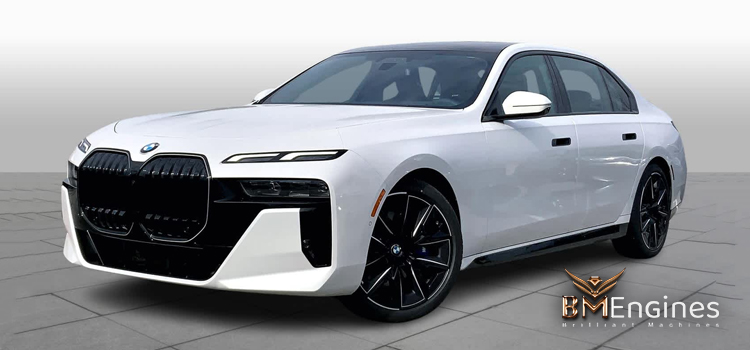The BMW 7 Series stands as a benchmark of luxury, innovation, and performance. Its engine forms the heart of its excellence, delivering a smooth, powerful, and responsive driving experience. However, over time, even the finest BMW engines can face wear and tear. Reconditioned engines offer an economical and sustainable alternative, ensuring the longevity of your vehicle. But the quality of these engines must be meticulously controlled to match BMW’s high standards. We explores the steps and considerations for ensuring quality control in reconditioned BMW 7 Series engines, including the processes, tests, and industry practices that ensure reliability and performance.
Thorough Inspection of the Core Engine
A successful reconditioning process begins with the inspection of the core engine. Trained technicians dismantle the BMW engine, examining each part for damage, corrosion, or excessive wear. Cracks, warping, and compromised seals are detected using advanced tools like borescopes and ultrasonic testers.
Damaged components such as pistons, crankshafts, or cylinder heads are either refurbished or replaced. This step is crucial as it determines the base quality of the reconditioned engine. Each component must meet BMW’s original specifications to ensure compatibility and optimal performance. A detailed inspection guarantees that only high-quality cores proceed to the reconditioning phase, ensuring the engine retains its BMW pedigree.
Using Genuine BMW Parts for Replacement
Reconditioning is not just about repairing; it’s about restoring the engine to its prime condition. Genuine BMW parts are essential to this process. Replacement parts, such as pistons, bearings, and valves, are sourced from certified suppliers to ensure they meet BMW’s rigorous standards.
Using counterfeit or low-quality parts compromises the engine’s reliability, longevity, and performance. Genuine components maintain the engine’s integrity, ensuring smooth operation and fuel efficiency. This adherence to authenticity upholds the precision engineering and excellence BMW is renowned for, making reconditioned engines as reliable as new ones.
Precision Machining for Component Restoration
Precision machining plays a pivotal role in reconditioning BMW 7 Series engines. Advanced machinery is used to restore components like cylinder heads, crankshafts, and engine blocks to factory specifications.
Processes such as honing, resurfacing, and polishing ensure that surfaces are smooth and properly aligned. For example, cylinder walls are honed to create the ideal crosshatch pattern, essential for oil retention and piston movement. This meticulous attention to detail minimizes friction, enhances efficiency, and ensures the reconditioned engine delivers the power and refinement characteristic of BMW engines.
Advanced Cleaning and Degreasing Techniques
Reconditioned engines undergo comprehensive cleaning to eliminate carbon deposits, oil sludge, and contaminants. Techniques like ultrasonic cleaning, vapor blasting, and chemical degreasing ensure every component is spotless.
Cleaning improves the engine’s performance and prevents premature wear caused by residual contaminants. For example, carbon build-up on valves and pistons can reduce compression and efficiency. Advanced cleaning restores the engine’s internal cleanliness, preparing it for reassembly and ensuring it functions as efficiently as a new BMW engine.
Rigorous Testing of Components and Systems
Testing is integral to quality control in reconditioned BMW engines. Components are subjected to stress tests to evaluate their durability under high loads and temperatures. For example, crankshafts undergo magnetic particle inspection to detect cracks or flaws invisible to the naked eye.
After reassembly, the complete engine undergoes a series of tests, including compression tests, leak-down tests, and dynamometer testing. These tests simulate real-world conditions, ensuring the engine delivers the performance, efficiency, and reliability expected from a BMW 7 Series engine.
Adherence to Industry Standards and Certifications
Quality control in reconditioned engines is upheld by adhering to industry standards and certifications. Reputable reconditioning facilities comply with ISO standards, ensuring consistent quality in their processes.
Technicians are trained and certified to work on BMW engines, ensuring they understand the intricacies of BMW engineering. These standards and certifications instill confidence in customers, assuring them of the reliability and safety of reconditioned engines.
Comprehensive Warranty and Post-Reconditioning Support
Offering a robust warranty is a hallmark of quality control in reconditioned BMW engines. A comprehensive warranty reflects the reconditioner’s confidence in their work. It also provides customers with peace of mind, knowing that any unforeseen issues will be addressed.
Additionally, post-reconditioning support, including maintenance guidelines and troubleshooting assistance, ensures the longevity of the engine. A dedicated support team helps customers maximize the benefits of their reconditioned BMW 7 Series engine.
Regular Maintenance and Inspection After Installation
Even after installation, regular maintenance is vital to preserving the quality of reconditioned engines. Following BMW’s maintenance schedule for oil changes, filter replacements, and inspections ensures the engine continues to perform optimally.
Periodic checks can detect potential issues early, preventing major problems and extending the engine’s lifespan. BMW engines are precision machines, and adhering to their maintenance requirements ensures they retain their performance and efficiency for years to come.

